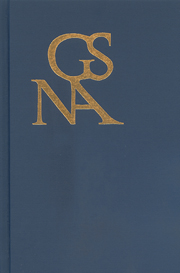Book contents
- Frontmatter
- Contents
- Special Section on Goethe's Lyric Poetry
- Introduction: New Approaches to Goethe's Lyric Poetry
- Intimacy, Morality, and the Inner Problematic of the Lyric
- Beyond the Poem: Strategies of Metapoetic Reflection in Goethe's Erster Weimarer Gedichtsammlung
- Meistersänger als Beruf: The Maieutics of Poetic Vocation in “Erklärung eines alten Holzschnittes …”
- Song or Narration?: Goethe's Mignon
- The Sucking Subject: Structural Ambiguities of Goethe's “Auf dem See” in Literary and Linguistic Perspective
- “Höhere Begattung,” “höhere Schönheit”: Goethe's Homoerotic Poem “Selige Sehnsucht”
- Poetry after Faust
- Forms of Knowledge/Knowledge of Forms: The Epistemology of Goethe's West-östlicher Divan and Cavellian Skepticism
- Im flüßgen Element bin und wieder schweifen: Development and Return in Goethe's Poetry and Hegel's Philosophy
- Goethe's Historical Particularism and the “Right Hand” of History: Early Modern State Building, Nobility, and the Feud in Götz von Berlichingen
- Where Are the Mountains?: Johann Jacob Bodmer and the “Pre-Kantian Sublime”
- The Politics of Aesthetic Humanism: Schiller's German Idea of Freedom
- Romanticism's Old German as Stepping-Stone to Goethe's World Literature
- Book Reviews
Forms of Knowledge/Knowledge of Forms: The Epistemology of Goethe's West-östlicher Divan and Cavellian Skepticism
from Special Section on Goethe's Lyric Poetry
Published online by Cambridge University Press: 05 October 2013
- Frontmatter
- Contents
- Special Section on Goethe's Lyric Poetry
- Introduction: New Approaches to Goethe's Lyric Poetry
- Intimacy, Morality, and the Inner Problematic of the Lyric
- Beyond the Poem: Strategies of Metapoetic Reflection in Goethe's Erster Weimarer Gedichtsammlung
- Meistersänger als Beruf: The Maieutics of Poetic Vocation in “Erklärung eines alten Holzschnittes …”
- Song or Narration?: Goethe's Mignon
- The Sucking Subject: Structural Ambiguities of Goethe's “Auf dem See” in Literary and Linguistic Perspective
- “Höhere Begattung,” “höhere Schönheit”: Goethe's Homoerotic Poem “Selige Sehnsucht”
- Poetry after Faust
- Forms of Knowledge/Knowledge of Forms: The Epistemology of Goethe's West-östlicher Divan and Cavellian Skepticism
- Im flüßgen Element bin und wieder schweifen: Development and Return in Goethe's Poetry and Hegel's Philosophy
- Goethe's Historical Particularism and the “Right Hand” of History: Early Modern State Building, Nobility, and the Feud in Götz von Berlichingen
- Where Are the Mountains?: Johann Jacob Bodmer and the “Pre-Kantian Sublime”
- The Politics of Aesthetic Humanism: Schiller's German Idea of Freedom
- Romanticism's Old German as Stepping-Stone to Goethe's World Literature
- Book Reviews
Summary
Unbegrenzt
Daß du nicht enden kannst, das macht dich groß,
Und daß du nie beginnst, das ist dein Loos.
Dein Lied ist drehend wie das Sterngewölbe,
Anfang und Ende immer fort dasselbe,
Und was die Mitte bringt ist offenbar
Das, was zu Ende bleibt und anfangs war.
Du bist der Freuden ächte Dichterquelle,
Und ungezählt entfließt dir Well' auf Welle.
Zum Küssen stets bereiter Mund,
Ein Brustgesang der lieblich fließet,
Zum Trinken stets gereizter Schlund,
Ein gutes Herz das sich ergießet.
Und mag die ganze Welt versinken,
Hafis, mit dir, mit dir allein
Will ich wetteifern! Lust und Pein
Sey uns den Zwillingen gemein!
Wie du zu lieben und zu trinken
Das soll mein Stolz, mein Leben seyn.
Nun töne Lied mit eignem Feuer!
Denn du bist älter, du bist neuer.
The poem “unbegrenzt” in the “Buch Hafis” of Goethe's West-östlicher Divan offers several problems for interpretation. Perhaps most obviously it is marked by the presence of, if not direct contradiction, then at least strong paradox. The poem's opening two lines address an unclear “Du” and attribute to that addressee the polar problems of being unable to come to an end (“Daß Du nicht enden kannst”) and never beginning (“daß Du nie beginnst”).
- Type
- Chapter
- Information
- Goethe Yearbook 20 , pp. 147 - 166Publisher: Boydell & BrewerPrint publication year: 2013



